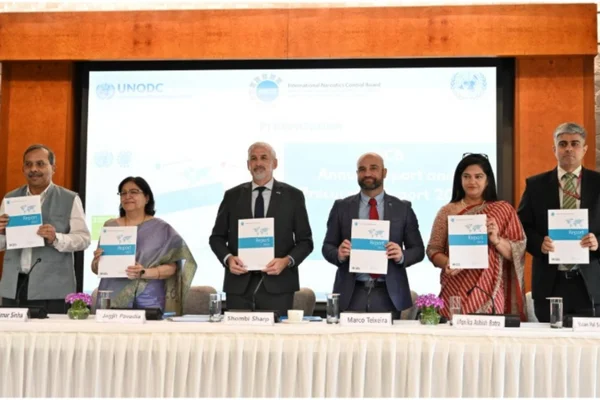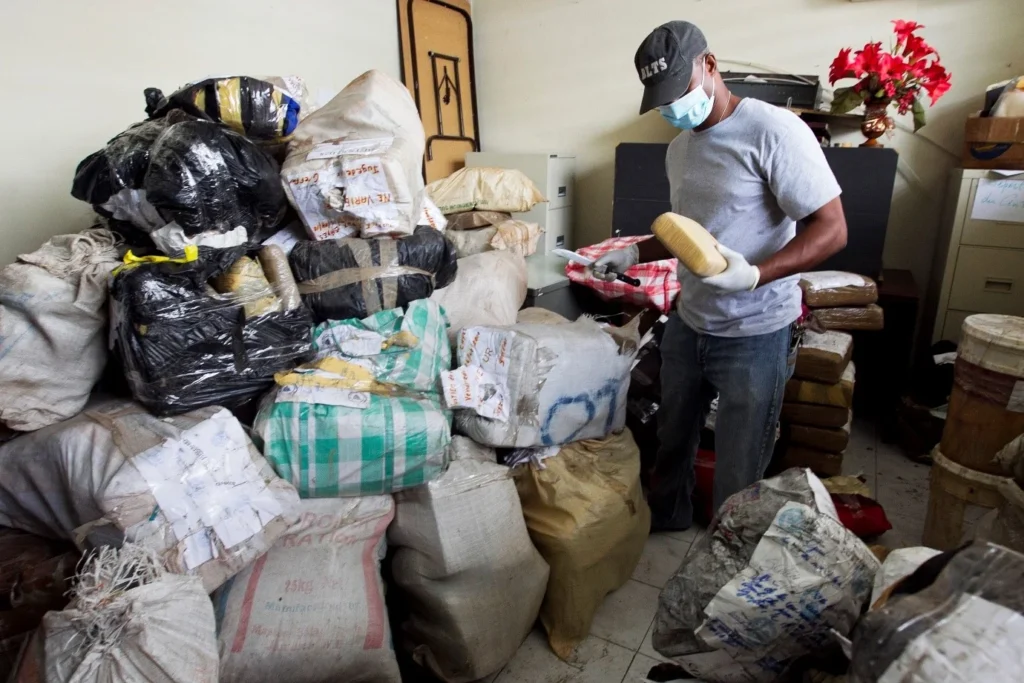The International Narcotics Control Board (INCB) released its 2023 Annual Report, shedding light on the growing complexities of online drug trafficking.
Challenges in Online Drug Trafficking:
- Increased Availability: Online drug trafficking has increased the availability of illicit substances on the dark web and legitimate e-commerce platforms.
- Exploitation of Online Platforms: Criminal groups exploit online platforms, including social media, for advertising and selling drugs globally.
- Risk to Patient Safety: Illicit Internet pharmacies selling drugs without prescriptions pose a significant risk to patient safety.
- Risk of overdose deaths due to the online presence of fentanyl and synthetic opioids.
- Increased exposure: Inaccessible content exposing children and adolescents to inappropriate material.
Law Enforcement Struggles:
- Daunting Task: Law enforcement faces a daunting task in monitoring and prosecuting online drug activities due to encryption methods, anonymous browsing, and the use of cryptocurrencies.
- Global Scale: The sheer scale of online drug trafficking poses challenges for effective law enforcement actions.
- Offenders take advantage of regions with less stringent law enforcement to evade extradition due to the global reach of the Internet.
- Global trade in illicit pharmaceuticals is estimated at 4.4 billion USD.
Recommendations:
Opportunities for Prevention and Treatment:
- Utilizing Internet for Campaigns: The INCB encourages governments to leverage the Internet and social media for drug use prevention campaigns.
- Raising awareness about the harms of drug use through social media.
- Sharing information about adverse consequences and warnings of adulterated drugs.
- Improving Access to Treatment: Online platforms, including telemedicine and Internet pharmacies, can enhance access to healthcare and drug treatment services.
- Creating legislation and policies: To prosecute illegal marketplaces operating on social media platforms.
- Use of real-time counter-trafficking tools: To generate actionable intelligence against traffickers exploiting e-commerce services.
International Cooperation:
- Global Collaboration: The global nature of online platforms requires collaborative efforts between governments, international organizations, regulatory authorities, and the private sector.
- INCB Initiatives: The INCB advocates voluntary cooperation between governments and online industries through initiatives like the GRIDS programme.
Regional Disparities in Access to Medicines:
- Persistent Disparities: Regional differences in access to opioid analgesics for pain treatment persist, with notable variations in Europe and North America.
- Addressing shortages: Need for accurate estimates of medical needs to address shortages.
Illicit Drug Supply Developments:
- Afghanistan: Decline in opium poppy cultivation calls for alternative livelihoods for affected farmers.
- North America: Opioid crisis continues with a rising number of deaths involving synthetic opioids.
- Amazon Basin: Drug trafficking organizations expand into illegal mining, logging, and wildlife trafficking.
- Cocaine Production: Record levels in Colombia and Peru; significant transit in West and Central Africa.
- European countries: Establishing regulated cannabis markets for non-medical purposes, raising concerns.
Precursors Report:
- Control Recommendations: INCB recommends placing 16 amphetamine-type stimulant precursors and two fentanyl precursors under international control.
- Concerns: Lack of audits and inspections in free trade zones susceptible to illicit activities; call for proper oversight.
About Global Rapid Interdiction of Dangerous Substances (GRIDS) Programme:
- The GRIDS Programme is a response to the UN General Assembly Resolution 73/192, aiming to address and counter the global drug problem.
- It builds upon existing INCB initiatives such as Project International Operations on New psychoactive substances, OPIOIDS, and Public-Private Partnerships, in collaboration with its global precursors programme.
About International Narcotics Control Board (INCB):
- INCB is the independent, quasi-judicial body charged with promoting and monitoring Governmentcompliance with the three international drug control conventions:
- The 1961 Single Convention on Narcotic Drugs
- The 1971 Convention on Psychotropic Substances
- The 1988 Convention against Illicit Traffic in Narcotic Drugs and Psychotropic Substances.
- Established in 1968 by the Single Convention on Narcotic Drugs of 1961.
- The 13 members of the Board are elected in a personal capacity by the Economic and Social Council for terms of five years.
Ref:Source
| UPSC IAS Preparation Resources | |
| Current Affairs Analysis | Topperspedia |
| GS Shots | Simply Explained |
| Daily Flash Cards | Daily Quiz |



